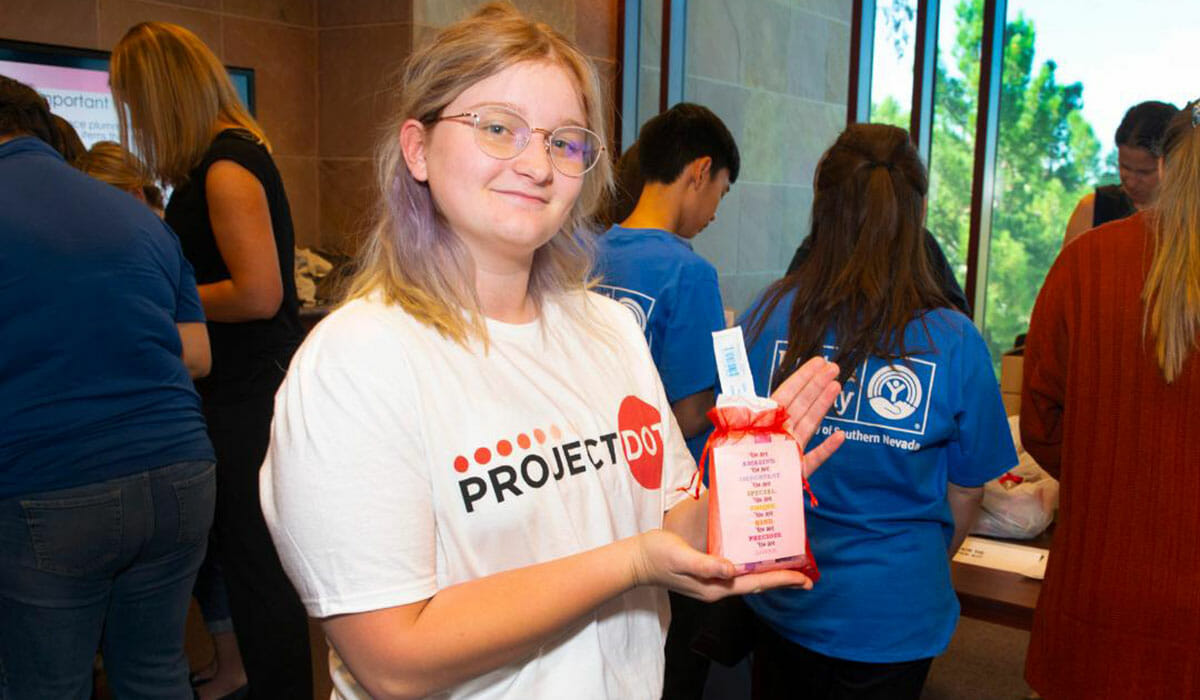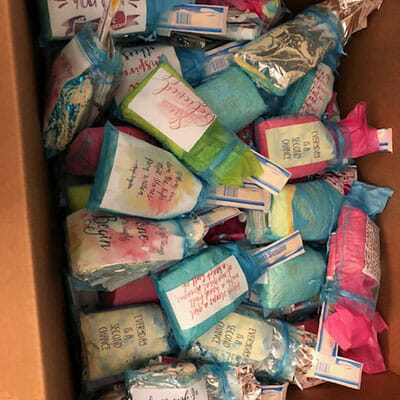Teenager Builds Feminine Hygiene Kits to Combat Period Poverty

Meet Daily Point of Light Award honoree Lindsay Wheeler. Read her story and nominate an outstanding volunteer or family as a Daily Point of Light.
Lindsay Wheeler and her best friend are two proud Las Vegas-born high-schoolers who want to make a difference – one Project Dot kit at a time. They came up with the concept for Project Dot after volunteering at many homeless shelters in their community. Lindsay saw that many of the homeless people coming to the food kitchens were women. However, when they volunteered with nonprofits that made hygiene kits for the homeless community, they noticed that the items in the bags were geared toward men.
Lindsay Wheeler realized that the women in the homeless community didn’t have any tampons or pads to help them when it was their time of the month. Most of the women only had one pair of clothes and a water bottle, but nothing for their periods. Lindsay realized homeless shelters also needed feminine hygiene products. There are a few shelters that have so many tampons and pads. However, women in the homeless community might but they don’t know how to use them correctly. The shelters don’t know how to discuss using feminine hygiene with the women as well and so there is a cycle of misuse.

Furthermore, she discovered low-income students in her school district may not have needed items unless they had to make a humiliating trip to the school nurse. For Lindsay, the worst results of period poverty are the young girls who miss school because they do not have access to feminine hygiene products.
“This is a problem within the entire homeless community,” says Lindsay Wheeler. “When saving and spending money, they’re only thinking about food, shelter, but not sanitation and feminine hygiene. They can buy coffee with SNAP but they can’t use it to purchase tampons or pads.”
Lindsay founded Project Dot to put an end to period poverty. Once a month, her team builds feminine hygiene kits for homeless shelters and schools. They work together in an assembly line. For homeless shelters, they add four tampons and four pads and for kits going to schools they include eight pads. Every kit includes lotion, wipes, toothbrush, nail file, inspirational message, and a little piece of candy, hair ties. Each kit is wrapped and placed in a felt back. Project Dot creates over 200 a month. Working with United Way, they had a kit building fundraiser that created over 500 kits in one month. Recently, Project Dot has been awarded a $9,000 grant from Wynn Hotel.
Lindsay says the main issue with periods and why feminine hygiene products are inaccessible is the stigma around it. There is a lot of shame and privacy surrounding periods. Instead, she believes the subject needs to be approached clinically and thoughtfully.
“We should talk about it as more of a positive thing,” says Lindsay. “It hurts, it’s not easy, but it’s perfectly normal. If we were to teach parents or kids how to deal with it, it may not stop period poverty, but it can help mitigate it.”
Lindsay feels like she is making a difference every day. The whole process makes her feel like she’s doing something right. When she delivers the hygiene kits she feels she is making an impact.
Do you want to make a difference in your community like Lindsay? Find local volunteer opportunities.
